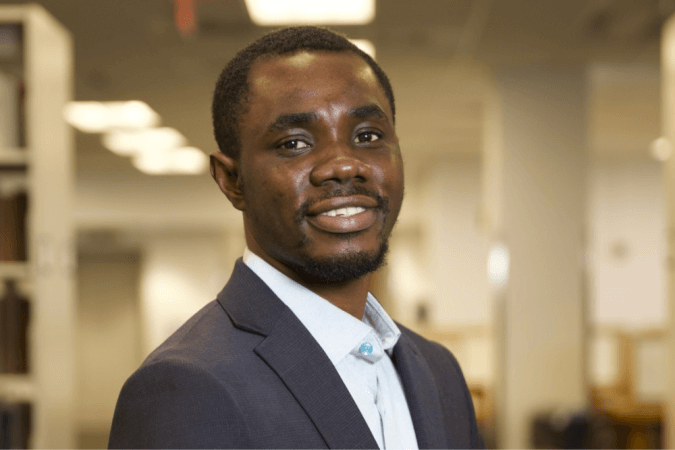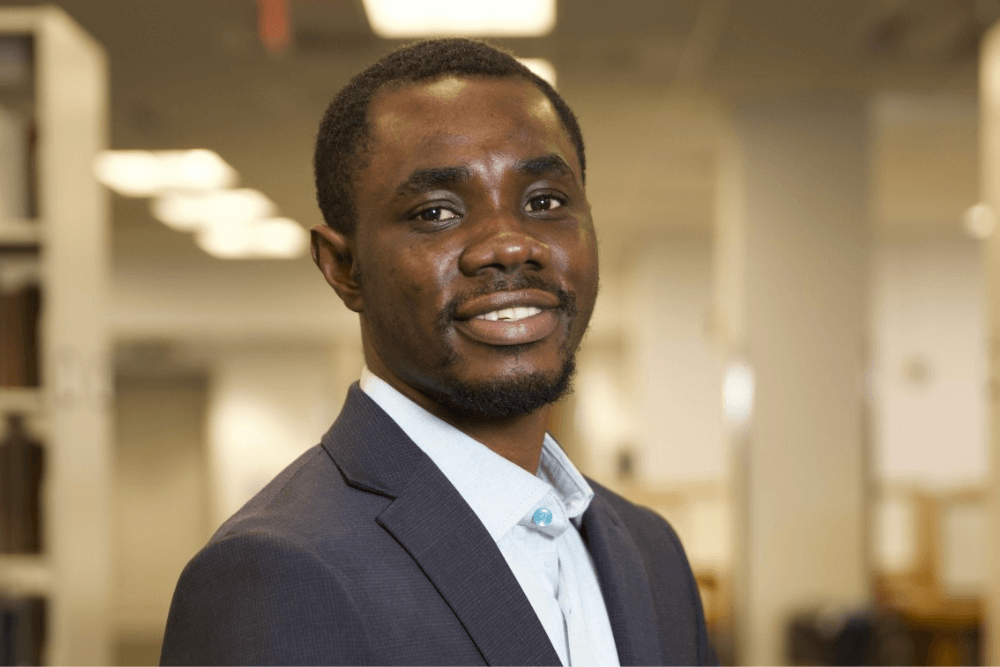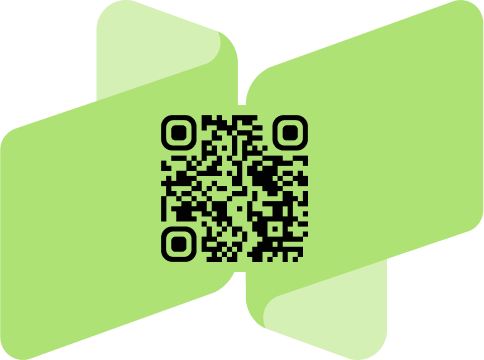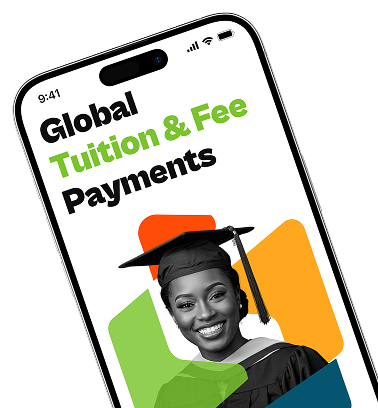The Pay4Me App featured Tope Amusa, a Nigerian student who pursued a master's degree in biostatistics at Georgia State University. Sharing his study abroad experience, Tope emphasized the importance of strong academic results, good recommendations, a well-crafted statement of purpose, and perseverance in the face of multiple application rejections.
Tope explained that application fee waivers do not disadvantage applicants and shared insights on the US visa interview process.

Let us know about you.
My name is Tope, and I graduated from the Federal University of Technology, Akure. I completed statistics as part of my first degree. I then pursued my master's degree in the Department of Mathematics and Statistics, with a concentration in Biostatistics, at Georgia State University.
Why mathematics, since it scares many students?
Of course, I mean, I think what's really the challenge is that most people have a very terrible background in mathematics. That has been the concern for almost everyone, including myself. My mathematical background was not particularly strong.
So, for anyone facing a challenge like mine, the basics are crucial. Don't forget the basics. If you can navigate the basics, everything in mathematics is just like having one plus one, like you are just recalling whatever you have done before.
What is it that inspired you to prepare to study abroad?
In my set, the 2018 statistics set, we had one of our big brothers who was in the department at the same time. In 2017, a program was established between the Federal University of Technology, Akure, and the Florida Agricultural and Mechanical University in Tallahassee. So, he took that route, and from there, he proceeded with his studies in the United States. Since that time, he would just be calling us like, “You guys don't waste your time. Just come to the United States.”
I have like three other friends who traveled, and they went on a fully funded scholarship. I was like, “Oh, if they can do that, I can do it." I started my application in 2021, and everything went smoothly from then on.
What were the steps you took for your study abroad?
It's important that you have a good result. And when I say 'very good result,' I'm not really saying 'first class.' Many people have the misconception that if you don't have a first-class degree, you can't study abroad.
I have a 2.1, and some people even have better 2.1s than I do. So, the step I took was to orchestrate my paths in a way that my results were aligned with what I needed abroad.
I just studied the trend of what the school really needs, and I just clocked myself into it. Also, the people you move with are very important. You need good recommendations from your lecturers or professors. I know you might not be very close to them. I am not very close with any of my professors, to be very frank. It wasn't until I graduated that I reached out to two or three of them.
How important is a recommendation for university admission?
Recommendation goes a long way when you want to study abroad. When schools review your application, they consider your statement of purpose as a form of recommendation. They review it because they want to know what you have done, how you can improve them, improve their departments, and how the funding they give you will not go to waste.
For the financial aspects, I don't have much of a problem because I was primarily looking for schools that offer application fee waivers. If I were going to pay the application fee, I would have asked many questions of the graduate coordinator at that school. Do you have funding? How many students do you fund?
There's also a test area. There's a misconception about IELTS, but if you are coming to the United States, most schools waive the IELTS requirement for Nigerians.
What is the disadvantage of asking for an application waiver?
Actually, it is not a disadvantage. The school for which I wrote an application fee waiver knows what it is doing. They know that fingers are not equal, and it doesn't disadvantage a student when it comes to funding.
When they give you an application fee waiver, that is just one of the first steps, not everything all together. You still need to submit your statement of purpose, transcripts, letters of recommendation, and some personal details as well. Those are the things they will take into consideration. So, they won't even say, ' Because you do not pay the the application fee, we will not give you funding, or we consider you. ' Many people received application fee waivers and fully funded offers.
What were the challenges you faced before going abroad?
So for everybody, the challenge differs. I have friends who applied to one school and got admission with full funding. I have people who applied to five schools or more before they got funding. However, for my own part, I tried the application in 2020 for the fall 2021 semester. I was admitted to some good universities, but I didn't receive a fully funded offer. I did not proceed with it because I knew I wouldn't be able to pay my tuition.
How do you handle applicant rejections?
You meet a lot of disappointments,,whiche we call love letters, whileothers call themrejection letters. They will first thank you for applying to their school, discuss your strengths, and then inform you that, unfortunately, they cannot admit you to their school.
At this time, there will be disappointments along the way. A lot of schools will give you rejection letters, and some will admit you, but they won't give you a fully funded offer. You need one yes to counter those ten disappointments.
How did you achieve good grades?
During my undergraduate studies, my 100-level results, particularly in mathematics, were not satisfactory. I had to go back to the basics. I began revising the material taught in secondary school that I had not fully understood. Also, the friends you make during your university days are very important.
I travel around a lot. Every weekend, you won't see me in school. I have gone to attend to my personal business and other matters. But I had friends who, when I came back, I just asked, 'Do you understand this course?' And they'll say, Okay, I understand. I will sit down with them, and they will review everything with me.
I make sure that, as much as I do my traveling and stuff like that, I don't let it affect my academics because I know this is one of the best ways to move out of the trenches.
From my 100-level to my 300-level first semester, I was not performing well academically. But what really changed was my 300-level second-semester results. I just had a good plan. I had a timetable for everything. From my 300-level second semester, a lot of things changed. I read as if my life depended on it, and it was very evident in everything I did.
How did you get a fully funded scholarship?
I would say that funding is a game of numbers. We have some great students who will apply to one school, and they got it. But it's not really like that for almost everybody. You need to apply. There's no way you get funding without applying.
Even if you spoke with a professor and he or she says, “Hey, you are going to work for me in my lab,” He or she will ask you to go and apply
You need to know what you want. What do I want to do? What do I want to study? What's my mission? What's my goal? It's very straightforward: search for schools. Numerous resources are now available online. We have a lot of people who have graduated, and they start dishing out a lot of resources online, like LinkedIn or Twitter (X).
Then, the next step of action I took was to obtain the email address of the graduate coordinator and email the person.
If you visit LinkedIn, you'll see many professors posting that they need two students, either PhD students or master's students, who can assist with this or that. Please send me an email. So, you have to email them and tell them about your achievement. Before you cold-email them, make sure you have read one or two of their papers, and tell them what you can do and how you will be able to improve their labs.
How do you search for schools that offer a fully funded offer?
Go to Google. If you are pursuing a statistics major, simply type 'fully funded offer in statistics.' You can put in 'United States' or 'graduate teaching assistant' if you want to be a teaching assistant in the United States. Type graduate teaching assistant programs in the United States and it will bring out tons of schools.
You need to message the graduate coordinator and ask, Hey, please, do you still have funding available for fall 2026 or spring 2027, or something like that?' Ask a lot of questions. So, if they have, they will let you know. Graduate coordinators are meant to inform you of things that nobody else will tell you. They will tell you we have a fully funded offer for everybody. Some will tell you we have a limited funding offer. Maybe they can say we have just eight opportunities. So you know exactly where you are targeting. The higher the number of schools you apply to, the higher your chances are.
How do you get a strong profile for a fully funded scholarship?
Another thing to note is that to receive a fully funded offer, you must have a very strong profile. What I mean by a strong proof is not because you graduated with a very good result, but rather that during your undergraduate studies, your research experience will go a long way. And for research experience, whatever you do during your projects, your undergraduate projects, that's one of your research experiences. Additionally, where you work can also serve as a valuable research experience.
How did you secure your F1 visa?
The United States offers a straightforward visa process for almost everyone. It is one of the funniest experiences you've ever had, as you only have at most two minutes to convince the visa officer. In fact, some people use only 30 seconds, and it's either they are out or they are in. For me, it wasn't particularly stressful. It was not really challenging because I did everything myself.
One of the questions they are going to ask you includes “Where are you going? It can be framed in any other way. They can say, “We see you are going to this place.” They are not expecting you to simply say yes and keep quiet.
How do you answer F1 visa questions?
Structure your stories and profile so that they will fit into every question. So for me, they asked where I was going. I told them I'm going to Georgia State University to pursue my master's degree in the Department of Mathematics and Statistics, with a concentration in biostatistics. And they asked me why biostatistics? I told them that, from my university days, I have been interested in the intersection of statistics and health. And so I like to pick it up.
Additionally, I completed several projects during my undergraduate studies that involved health-related topics. These projects, which I undertook while in school, provided a valuable springboard for me to pursue a career in biostatistics. I want to connect statistics and the health aspect of it, which is why I'm pursuing a career in biostatistics. And she said, 'Okay,' and also asked, 'What was my graduation plan?'
When they ask about your graduation plan, you will convince them that after I'm done studying, I will return to Nigeria or wherever the case may be to become a statistician. Because, you know, there are gaps everywhere. You need to tell them that you want to fit into this gap. You want to plug in and help a lot of people in Nigeria or wherever you come from. I want to help.




